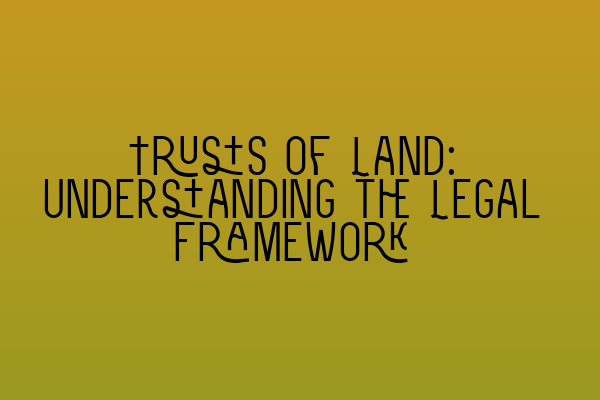Trusts of Land: Understanding the Legal Framework
Welcome to the blog of SQE Property Law & Land Law! As solicitors specialized in property law, we understand the intricate legal frameworks surrounding trusts of land. In this blog post, we will dive into the fundamentals of trusts of land and help you gain a comprehensive understanding of this subject.
What is a Trust?
To begin, let’s establish what a trust is. A trust is a legal arrangement in which a person, known as the settlor, transfers assets to another person, known as the trustee, to hold and manage those assets for the benefit of specified individuals, known as the beneficiaries. The terms of the trust are set out in a legal document called the trust deed.
Trusts of Land
In the context of property law, a trust of land is a type of trust where the assets involved are land or interests in land. It allows for the separation of legal ownership and beneficial ownership of the property. This means that while the legal title remains in the name of the trustee, the beneficiaries have equitable rights and interests in the land.
Types of Trusts of Land
There are different types of trusts of land, including express trusts, resulting trusts, and constructive trusts.
Express Trusts: An express trust is created when the settlor explicitly states their intention to create a trust and specifies the terms and beneficiaries in the trust deed.
Resulting Trusts: A resulting trust arises when a property is purchased in the name of one person, but it is intended for the benefit of another. This can occur, for example, when a parent purchases a property in their name but intends for it to be used by their child.
Constructive Trusts: A constructive trust is imposed by a court to correct wrongful actions and prevent unjust enrichment. It can arise in situations where someone holds legal title to the property, but it would be unfair for them to keep the beneficial interest.
Legal Framework for Trusts of Land
In England and Wales, the legal framework for trusts of land is primarily governed by the Trusts of Land and Appointment of Trustees Act 1996 (TOLATA). This act sets out the rules and principles for the creation, administration, and termination of trusts of land.
Under TOLATA, a trustee has various duties and powers, including the duty to act in the best interests of the beneficiaries and the power to manage and dispose of the trust property. The act also provides a mechanism for resolving disputes related to trusts of land, such as the appointment of trustees and the determination of beneficial interests.
Importance of Trusts of Land
Trusts of land play a crucial role in property transactions and estate planning. They provide a flexible and efficient mechanism for holding and managing property, allowing for the protection of assets and the equitable distribution of benefits to beneficiaries.
By understanding the legal framework surrounding trusts of land, you can make informed decisions when dealing with property matters and ensure that your interests are protected.
If you’re interested in learning more about property law, trusts of land, or preparing for the SQE exams, we recommend checking out the following articles:
1. SQE 1 Practice Exam Questions: [link to https://fqps.co.uk/sqe/sqe1-preparation/mcq-practice-quiz]
2. SQE 1 Practice Mocks FLK1 FLK2: [link to https://fqps.co.uk/sqe/sqe1-preparation/practice-mocks-quiz]
3. SQE 2 Preparation Courses: [link to https://fqps.co.uk/sqe/sqe2-preparation]
4. SQE 1 Preparation Courses: [link to https://fqps.co.uk/sqe/sqe1-preparation]
5. SRA SQE Exam Dates: [link to https://fqps.co.uk/sqe/sqe1-sqe2-exam-dates]
We hope this blog post has provided you with valuable insights into trusts of land and the legal framework surrounding them. If you have any further questions or require legal assistance with trusts of land, please don’t hesitate to contact us at SQE Property Law & Land Law. We are here to help!
